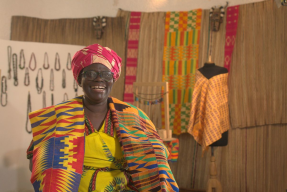By Kevin Henderson, KF11, Mongolia
I’ve been in Mongolia’s capital city, Ulaanbaatar, for over a week and I’m quickly learning many things about a place that I previously knew very little about: the food is quite tasty – there are even vegetarian cafes that can provide a good break from the typical meat-rich diet – English is spoken by fewer people than I had hoped and the traffic is a bit intense. Pedestrians do not have the right of way and the flow of traffic can be unrelenting. Patience when crossing the street – that’s probably the first thing I learned.
Prior to coming to Mongolia and beginning my fellowship with Credit Mongol, one of Kiva’s newest field partners, I thought of Mongolia as a country that was developing quite slowly economically. It turns out that Mongolia’s economy, which historically was dependent on assistance from the Soviet Union and primarily focused on herding and agriculture, is shifting gears in a big way. Although it has been hit hard by the global economic slow down, one predication is that Mongolia’s GDP could triple in the next decade. And yes, major retailers are poised to take advantage of Mongolians’ increasing prosperity. I was surprised to find that luxury brands such as Armani, Zegna and Louis Vuitton have established stores in central Ulaanbaatar.
The Louis Vuitton store in Ulaanbaatar opened in 2009
Economic growth is being driven primarily by the development of the mining sector. Recently the government signed multibillion-dollar deals with major corporations such as Rio Tinto and China’s state owned wealth fund China Investment Corp. to develop gold, copper and coal deposits among other mineral assets. In a research paper that attracted international headlines, one investment firm popularly termed the economy the “unstoppable Mongolian wolf.”
The development of natural resources is controversial. For now though the influx of foreign capital is going to continue and it is going to affect Kiva borrowers. This is why I believe microfinance and Kiva will continue to be very important.
Despite the potential for significant economic growth, a large portion of the population currently exists near or below the poverty line. The harsh winter has only worsened the situation for many people who have now lost their livestock and are coming to the city in hopes of finding better opportunities. By providing loans to small businesses, like souvenir makers, and enabling Mongolians to fund home construction, Kiva lenders provide financial independence that allows borrowers to engage with their economy on more equal footing. The souvenir maker, for example, can increase his working capital to prepare to take advantage of his expanding market and continue to pursue his craft as an alternative to taking a job in a mine. Without Kiva, I’m not sure he would have that choice.
Kiva’s vision is “Everyone connected. Everyone empowered.” As Mongolia’s economy takes flight, my hope is that Kiva lenders will make it possible for all Mongolians to reap the benefits.
Lend to a borrower in Mongolia!
Kevin Henderson is serving at Credit Mongol in Ulaanbaatar, Mongolia as a member of Kiva Fellows 11th Class.















